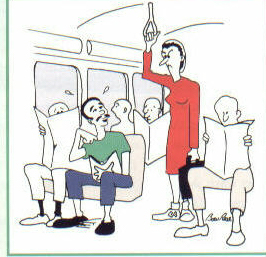American women’s double standard
By Soumanou Salifou

Founder, Publisher and CEO
The student advisor at the American embassy back home in Africa had warned me that I would have to adjust to American culture on and off campus. And I tried to do just that. My previous long stays in Europe had somewhat prepared for it. I was first impressed by the friendliness of most Americans whom I found more outgoing than the average European. Some not only say “Hi” but also gratify you with a seemingly genuine smile. But I had a slight problem with the women.
I used to live in the suburbs, and I had to commute to school in Washington, D.C. every morning. I always had a seat on the bus before it got filled gradually as we traveled a long way to the city. When all the seats were taken and a woman came aboard, I made it a special point to get up and offer my seat. My offer was sometimes turned down, occasionally with hostility.
That bothered me quite a bit. One day, a woman was so annoyed by my innocent offer that she mumbled something close to an insult. I was particularly confused that day, so I asked an American schoolmate what was the matter. He explained to me that most American women feel offended when a man offer them his seat on the bus or on the metro. To them, he said, it is an expression of the man’s machoism and his false sense of physical superiority. I was shocked because I knew better. I had seen women run faster than men during track and field competitions. I had seen women drive heavy trucks just like men.
Back in Africa, I had seen female relatives chop wood while carrying babies on their backs. I was raised by my mother, a widow who did it all by herself with help from no one. But I did not thing that was a reason not to show that little thing called gentlemanliness! However, I did not want to be perceived as a macho. So I adjusted immediately. From then on, whenever a woman came aboard after all the seats were taken, I tried to be a little more comfortable. No longer did I go out of my way to try and, open the door for a woman—a classmate or a teacher—struggling with a stack of books in her hands. I also stopped offering my umbrella in the rain to any female.
But then I was confused again, when I started a family and was expected to take the, trash out the night before garbage collection day. I was also expected to mow the lawn, to make sure the cars were in good, working conditions, or to take them to the garage in case of a problem. I had (and still have) to carry out a rack of “heavy duties” that seem to be naturally the “man’s job” to me, and which were not necessarily harder than standing in a crowded bus for almost thirty minutes.



